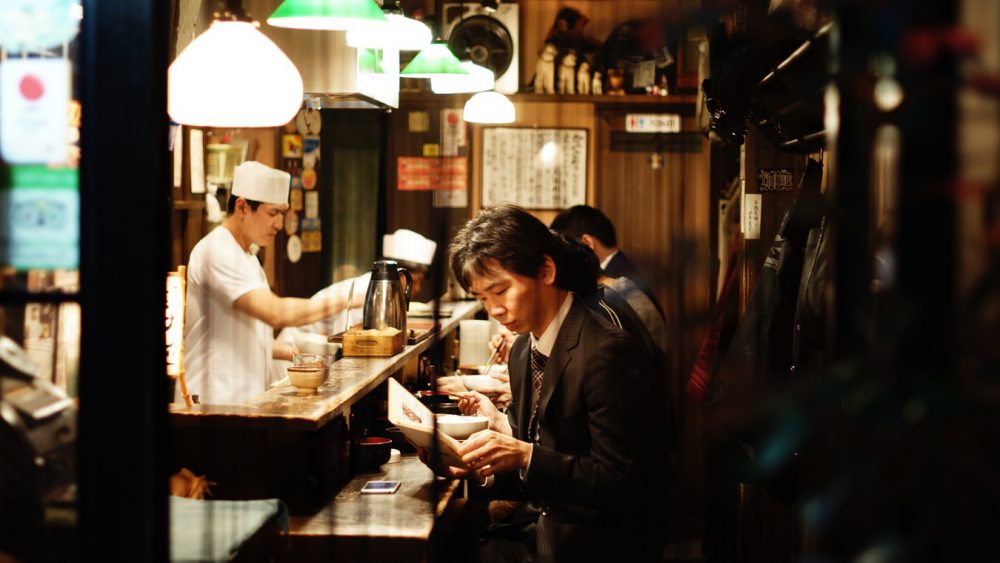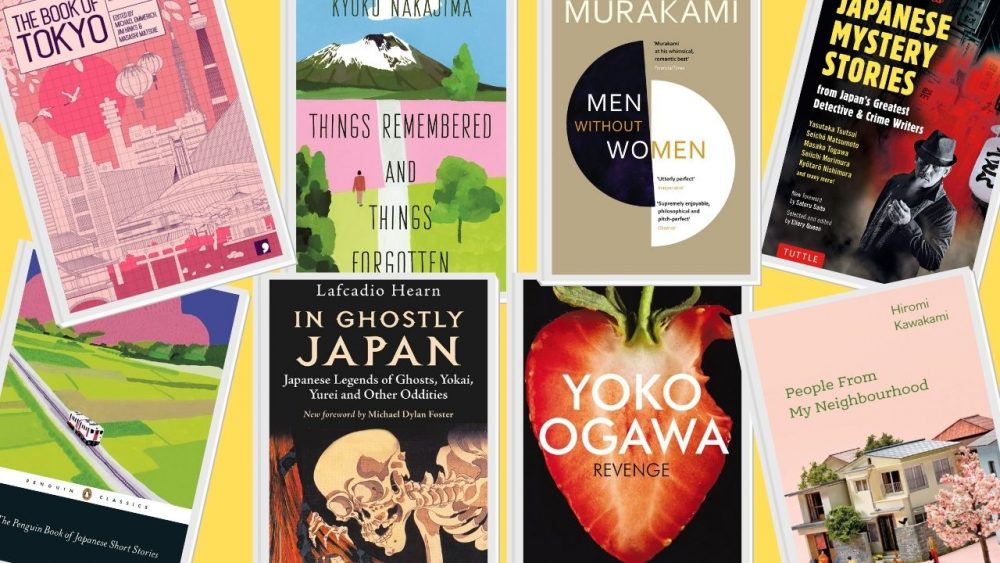‘Wrapped up in our hectic lives, there’s something soothing about reading a narrative that has nowhere to be.’
Guest Post courtesy of Osusume Books

The narratives found in Japanese literature have a unique power to heal the minds of its readers. A tough day of work ends. It’s time to flush the stress out of your system. ‘I need to relax’, you tell yourself. But how? For some, relaxing might mean meeting up with some friends; for others, it’s exercising or enjoying a glass of wine. Maybe it’s a long soak in a warm bath that does the trick.
For others, relaxing means opening up a Japanese book and welcoming the warm, comforting escape of the world found within.

Reading just a few pages of any novel allows us to exit our real lives, set aside our anxieties, and welcome in a soothing, mesmerising atmosphere that gets us purring with pleasure through the night.
Known as healing novels (iyashi-kei shōsetsu), certain Japanese books stand out for their soothing qualities. Reading authors like Haruki Murakami, Toshikazu Kawaguchi, Kurita Yuki, Kinae Minoto, Hiromi Kawakami, and Banana Yoshimoto, in particular, will half your heart rate as you sink into their stories.
Words of healing for a wounded Japan
Where do these Japanese healing novels come from?

The collapse of Japan’s bubble economy, which the nation enjoyed throughout the 1980s, sparked a catastrophic recession from February 1991 that, to this day, means Japan’s Lost Generation struggle to get their foot in the door of the job market.
On the other hand, those in work have to deal with a brutal working culture that carries the risk of karoshi (death by overwork), and the pressures of pulling your weight in a small workforce caused by Japan’s ageing population. Saying that, Kanae Minato’s Confessions seems to speak to a wounded Japan. The novel’s narrator tells the reader:
‘If the place in which you find yourself is too painful, I say you should be free to seek another, less painful place of refuge. There is no shame in seeking a safe place. I want you to believe that somewhere in this wide world there is a place for you, a safe haven.’
Wise to the situation, perhaps Japanese writers wanted to place a comforting hand on the shoulders of its people by handing them this anti-anxiety, low stress style of fiction.
Read More: Japan History and Culture Books

But what makes Japanese books so calming? There’s meaning in the mundane.
Many Japanese authors give us reflective, calming, and meaningful narratives (rather than frantic ones) by grounding them in the mundane of everyday life. See the unemployed Toru in Murakami’s The Wind-Up Bird Chronicle:
‘I let the phone ring three times and cut the sandwich in half. Then I transferred it to a plate, wiped the knife, and put that in the cutlery drawer, before pouring myself a cup of coffee I had warmed up. Still the phone went on ringing’.
There’s something therapeutic here. Toru’s food ritual is sacred to him, and takes priority. In contrast to fast-paced, action-packed plots, it’s these methodical page-turners that reel us in. (Also see Killing Commendatore, a 704-page story of an artist who spends most of his time thinking, cooking, and painting).
Wrapped up in our hectic lives, there’s something healing about reading a narrative that does not rush and has nowhere to be.
Similarly, Banana Yoshimoto’s The Lake shows an aspiring graphic artist who spends most of her time staring out of the window. She says: ‘I love feeling the rhythm of other people’s lives. It’s like traveling.’ This is patient and tranquil writing. Japanese literature enjoys the presence of empty space in a way most other forms of literature do not.
This approach to space can be see in classical Japanese sumie ink painting, in which the empty white space has its own definition: yohaku no bi (the beauty of extra white). What is left empty matters as much as what is filled in. This is evident in the novels of Haruki Murakami, Yuko Tsushima, Yasunari Kawabata, and many others. The quiet space, the slow tempo, and the calmness of these Japanese authors’ stories can be felt and lived in as we read them.
Soothing, dream-like reality

So many books within the world of Japanese literature is packed full of ordinary, everyday people: waitresses, artists, office workers, writers, the unemployed. Not only do we relate to these characters immediately, through their jobs alone, but we become wrapped up in the weightless, dream-like feel of their lives.
Many of these protagonists are struck by loneliness, but a beautiful solace comes from getting to know them because all of us, deep down, know what it’s like to feel alone.
‘That’s why I left the flat. Out on the street, I wanted to make sure that I wasn’t the only one here, that I wasn’t the only one feeling lonely.’
— Tsukiko, Strange Weather in Tokyo by Hiromi Kawakami)
A hint of hope

Despite their slow, soothing, gentle pace, in these Japanese novels we can often find a subtle mystery and hint of hope that warms us. In Yoshimoto’s The Lake, for example, our protagonist Chihiro reflects:
‘But I have my life, I’m living it. It’s twisted, exhausting, uncertain, and full of guilt, but nonetheless, there’s something there.’
Similarly, in Yoshimoto’s Kitchen, our narrator Mikage says:
‘In the uncertain ebb and flow of time and emotions, much of one’s life history is etched in the senses. And things of no particular importance, or irreplaceable things, can suddenly resurface in a café one winter night’.
Like Mikage, perhaps we wish to stumble across our own unique, irreplaceable things, and find great consolation in the possibility.
The Healing Literature

It’s no surprise, then, to hear of Tokyo psychiatrist, Machizawa Shizuo, who reports that his depressed patients find ‘an optimism and brightness absent in their own lives’ by reading Banana Yoshimoto. The author is no stranger to death, and she deals with it in her works with bluntness, honesty, and even humour. She makes us feel comfortable with all sides of life and, like a therapist, offers us the chance to accept it.
But more than this, the booming popularity of translated Japanese authors across the globe hints at special kind of quality that drives readers across the globe to immerse in the soothing bubble of their stories. This is the healing power of Japanese literature. And we recommend you embrace it.
Did you enjoy this article? Keen to read some Japanese books? Head over to Osusume Books and browse their Book Packages. They send the very best of translated Japanese literature straight to your doorstep!
Osusume Books send translated Japanese books to their subscribers every month. It is the place to go to read Japanese books in English, and discover more about Japanese literature and authors.



